Cite this document
(Justice for All Persons All Around the World Case Study, n.d.)
Justice for All Persons All Around the World Case Study. Retrieved from https://studentshare.org/law/1536977-public-international-law
Justice for All Persons All Around the World Case Study. Retrieved from https://studentshare.org/law/1536977-public-international-law
(Justice for All Persons All Around the World Case Study)
Justice for All Persons All Around the World Case Study. https://studentshare.org/law/1536977-public-international-law.
Justice for All Persons All Around the World Case Study. https://studentshare.org/law/1536977-public-international-law.
“Justice for All Persons All Around the World Case Study”. https://studentshare.org/law/1536977-public-international-law.


